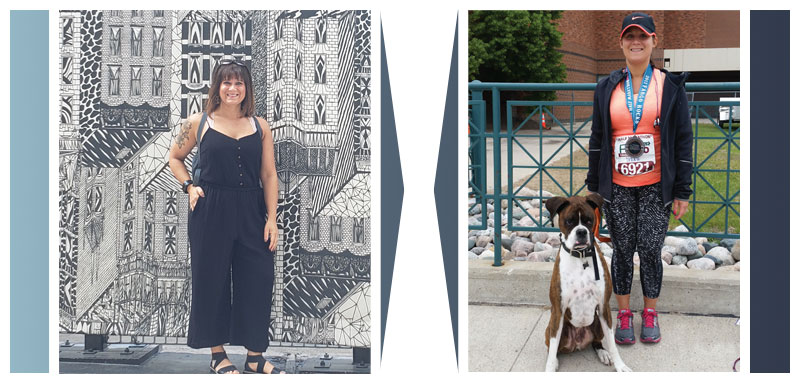Sarah Swanson dreaded her first step each morning.
The instant her right heel touched the floor, Swanson felt “an almost crippling pain.”
Just two years prior, she had finished her first marathon in Fargo in 2011. And she was training for her third, run-
ning up to 10 miles each day.
“After running, my heel would get really tight. I took a lot of Advil, six to eight pills a day, which is not healthy,” says Swanson, who works as the specialty shop manager at Scheels in Fargo, where she and her husband, Lee, reside with their boxers, Archer and Lana.
After her fourth Fargo Marathon in 2014, the thirty-some-thing Swanson sought a podiatrist. She learned her pain had a name: plantar fasciitis. This condition involves a painful inflammation of a thick band of tissue, known as the plantar fascia, that runs across the bottom of your foot and connects your heel bone to your toes.
Plantar fasciitis affects two million adults in the United States, according to the American Physical Therapy Association. Swanson’s intensive running and retail career, which requires standing for hours on hard floors, likely contributed to the condition.
At her podiatrist’s recommendation, she tried inserts in her shoes — first, over-the-counter inserts, and then custom-made. Neither provided relief.
While Swanson is no fan of needles, she agreed to a cortisone injection. Sadly, the relief lasted one week or two. Her second injection six months later provided similar disappointing results.
Next, she began physical therapy, including the Graston technique, in which the therapist uses a stainless-steel tool to find restrictions and then scrape the tissue to break it up and restore use. Swanson describes that treatment as more painful than the cortisone injections.
“It helped a lot, until I started running,” says Swanson, who had reduced her daily runs to five miles.
Finally, she tried deep tissue massages weekly for the next six months. Still, no lasting relief.
After exhausting every treatment option, a discouraged Swanson searched the internet and learned about regenerative medicine. Many professional athletes, including Tiger Woods, as well as weekend warriors have turned to regenerative medicine to overcome injury.
Swanson discovered platelet rich plasma (PRP) therapy could be performed at Center for Pain Medicine in Fargo. She made an appointment to see Dr. Majid Ghazi, a board-certified anesthesiologist and interventional pain physician.
“He was very credible, very reassuring and he knew what he was doing,” Swanson says. Ghazi ordered an MRI of her foot to confirm the diagnosis of plantar fasciitis.
“Regenerative medicine is an area of medicine that utilizes the body’s own biologics to repair tissue injury and restore function,” Ghazi says. “PRP therapy is especially effective at reducing inflammation and speeding soft tissue healing.”
Unlike cortisone injections or surgery, PRP immediately triggers your body to heal itself. And patients often experience reduction in pain in four to six weeks.
Once again, Swanson faced her strong dislike of needles in her quest to be pain-free.
On July 11, 2018, Swanson underwent PRP therapy, an outpatient procedure, which is performed in the center’s in-house operating room in a sterile environment. Swanson’s blood was drawn and processed in a centrifuge, which isolates platelets and their growth factors. These
growth factors help injured tissue to heal faster. Ghazi then re-injected PRP into her foot at the site of the injury.
For the next two months, Swanson worked with a physical therapist from PT/OT Partners, which is housed in same building, to stretch and strengthen her heel to prepare it for running. And Swanson felt gradual pain relief within three months of PRP therapy.
“Although plantar fasciitis is a common problem, it can be difficult to treat,” Ghazi adds. “Cortisone injections can increase damage and surgery is not often an effective option. PRP therapy is a safe, little-known treatment that could help so many.”
Now, Swanson runs one to two days weekly—without pain. And she completed the half-marathon in the Twin Cities Marathon in October 2018. She’s incorporated variety to her workouts, adding indoor cycling and strength training.
She’s not the only one who is pleased with the results. “My husband, Lee, is incredibly happy that he doesn’t have to listen to me complain about how much my foot hurts,” Swanson jokes.
Swanson plans to have PRP therapy on her left heel in the future. Because the treatment is not covered by insurance, she is saving up for it.
“When I think of how many things I tried and didn’t work, this is the one thing that gave me lasting relief,” Swanson says. “It’s natural, no drugs in my body, no side effects. It’s almost mind-blowing.”
Read more patient stories.
 Xanax Prescription Online Legal Buying Alprazolam Online Buy Discount Xanax Order Cheap Xanax Online Can You Buy Alprazolam In India Xanax Brand Online
Xanax Prescription Online Legal Buying Alprazolam Online Buy Discount Xanax Order Cheap Xanax Online Can You Buy Alprazolam In India Xanax Brand Online


Recent Comments